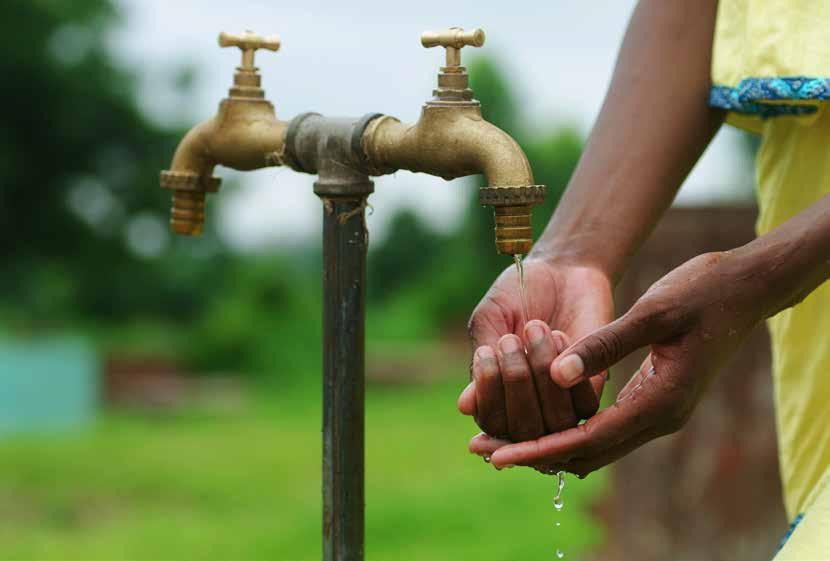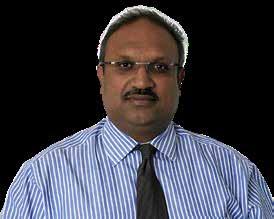
3 minute read
Chair’s comment
TAKING A DECENTRALISED APPROACH
2020 was a year of intense disruption and change. As we enter 2021, we are offered an opportunity to reflect on our current systems and consider new, innovative and alternative solutions to some of our most pressing challenges. By Dan Naidoo
Advertisement
Many of our water and sanitation solutions to date have focused on a traditional, centralised approach. This is often driven by a belief that working at scale reduces unit costs and offers easier and cheaper operation. The result is massive infrastructure spend and long-term implementation.
But this poses several challenges. First, in our current constrained economic climate, the massive costs of large infrastructure roll-out prohibit these projects from being implemented. Risk is also a major factor for investment, and with local government’s risk factor currently very high, securing funding sources presents a major challenge due to poor payment for services.
In addition, the long-term nature of these large projects means that the people who need services have to wait several years before the implementation phase is reached. Added to this, connecting many of South Africa’s outlying rural and peri-urban areas to a
Dan Naidoo, chair, WISA


centralised system is simply not practical or cost-effective.
Bigger is not always better; unfortunately, we often forget about the smaller, easier projects that can assist with water supply and sanitation. The Covid-19 crisis has shown that decentralised water solutions can be implemented. However, it is now vital that we focus on sustainable, off-grid solutions and plan accordingly for these in order to deliver services to the more than 3 million people who still do not have access to a basic water supply service and the 14.1 million people who do not have access to safe sanitation.
Changing attitudes Decentralised water and wastewater treatment technologies and off-grid sanitation technologies have progressed significantly in recent years. In many cases, these technologies are just as good as their large-scale counterparts and,
more often than not, better for the environment.
This is particularly the case for sanitation technologies, many of which are now designed to reuse water and transform waste into energy or viable products such as fertilisers. Unfortunately, the promise of the flush toilet being the ‘gold standard’ has created a major stumbling block – a problem not unique to South Africa.
Recipients are often resistant to off-grid and decentralised solutions, viewing them as second rate. This prevents many of these technologies from being adopted and is a contributing factor to governments not considering decentralised options and stand-alone schemes at all, or viewing them as only an intermediate solution. This despite that fact that they can provide very good long-term solutions.
It is vital that we work to change this mindset and educate users on the benefits of these technologies. Importantly, communities must be consulted before such technologies are implemented in order to ensure user acceptance.
Programmes such as the South African Sanitation Technology Demonstration Programme (Sastep) – driven by the Water Research Commission – are leading the way in this regard, offering a platform and support for the development of highly innovative sanitation technologies with the potential to disrupt the sanitation space. These include: • off-grid, front-end sanitation solutions that require little or no water for flushing • urine diversion technologies • off-grid faecal sludge treatment technologies • off-grid blackwater treatment technologies • innovative sanitary pad disposal systems • off-grid sanitation solutions that produce beneficial products from sanitation waste. It is vital that we support programmes like this in order to drive the off-grid revolution.
Changing the conversation Unfortunately, the conversations around socio-economic development and providing better solutions often don’t consider a decentralised approach. It is simply not possible to have every household in the country connected to centralised water and sewer networks, and it is therefore critical that we change the conversation and place a far greater focus on decentralisation.
The systemic solutions lie outside of the traditional approach – an approach that is clearly failing us as our water losses continue to climb, and we hear increasing reports of sewage polluting our natural water courses.
Last year taught us to embrace change and learn to cope with the widespread disruption of our current way of doing things. As we begin 2021, I challenge you to think more innovatively and consider alternative solutions as we continue to get #AllHandsOnDeck to address our water and sanitation needs. This commitment must present itself in revised IDPs and infrastructure master plans, together with alternative funding and economic models.










